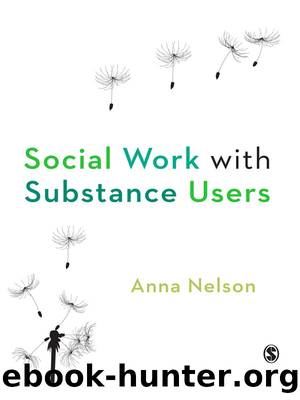Social Work with Substance Users by Anna Nelson

Author:Anna Nelson [Nelson, Anna]
Language: eng
Format: epub
ISBN: 9781848602229
Barnesnoble:
Publisher: SAGE Publications
Published: 2011-11-09T00:00:00+00:00
Harm reduction
Harm reduction has come about partly in response to the âone size fits allâ attitude of abstinence approaches to problematic substance use, but is primarily a policy-driven, evidence-based approach to reducing the substance-related harm caused to individuals, families and communities. It is primarily concerned with preventing blood-borne diseases, particularity HIV and hepatitis, and preventing overdose and substance-related death (NTA, 2008a), as well as focusing on public safety. At a social level, for example, we can see harm reduction strategies embedded in much of the legislation and policies regarding alcohol use. There are laws around who can sell alcohol, who can buy alcohol, who can drink alcohol and where it can be drunk. There are public education campaigns raising awareness about âbinge drinkingâ and âsaferâ drinking limits, and restrictions on where and when alcohol can be advertised. All of these things are in recognition that people are going to use alcohol and that given this, individuals should be aware of how to drink safely to limit the harms that can be caused by excessive use and binge drinking.
Similar harm reduction strategies are apparent where illicit drugs are concerned, but these have attracted much more negative attention. Harm reduction strategies for drug use include needle exchange programmes, advice and support on safer injecting practices and preventing infections, and advice and support on preventing overdose. These strategies are highly contentious and opponents of harm reduction strategies believe that such interventions only seek to encourage drugs users to continue using drugs. Although controversial, the retention rates and overall success of harm reduction interventions are very good (Farrell et al., 2005; Hunt et al., 2006; Marlatt, 1996; Tatarsky, 2003).
Many substance users avoid seeking help with problematic substance use because they have no intention of âgiving upâ and assume that they will be persuaded to do so by substance use treatment services (Tatarsky, 2003). They therefore neglect to seek help and continue to have problems related to their substance use. By accepting that not all people want to give up substance use, harm reduction opens the door for a variety of service users who would otherwise not be eligible for traditional abstinent-based treatment programmes. The number of theories that abound in explanation of problematic substance use are evidence of the variety of factors and variables that can potentially be involved when someone has problematic substance use. Harm reduction allows us to work with individuals and their families âwhere they are atâ and with what their goals are, rather than just requiring abstinence for all. Just as everyoneâs reasons for using substances may be different, so may be their goals. They may want to continue to use, cut down, use differently or give up. Harm reduction allows us to acknowledge that.
Download
This site does not store any files on its server. We only index and link to content provided by other sites. Please contact the content providers to delete copyright contents if any and email us, we'll remove relevant links or contents immediately.
Cecilia; Or, Memoirs of an Heiress — Volume 1 by Fanny Burney(32549)
Cecilia; Or, Memoirs of an Heiress — Volume 2 by Fanny Burney(31947)
Cecilia; Or, Memoirs of an Heiress — Volume 3 by Fanny Burney(31932)
The Great Music City by Andrea Baker(31917)
We're Going to Need More Wine by Gabrielle Union(19035)
All the Missing Girls by Megan Miranda(15962)
Pimp by Iceberg Slim(14489)
Bombshells: Glamour Girls of a Lifetime by Sullivan Steve(14058)
For the Love of Europe by Rick Steves(13946)
Talking to Strangers by Malcolm Gladwell(13350)
Norse Mythology by Gaiman Neil(13349)
Fifty Shades Freed by E L James(13233)
Mindhunter: Inside the FBI's Elite Serial Crime Unit by John E. Douglas & Mark Olshaker(9324)
Crazy Rich Asians by Kevin Kwan(9280)
The Lost Art of Listening by Michael P. Nichols(7494)
Enlightenment Now: The Case for Reason, Science, Humanism, and Progress by Steven Pinker(7306)
The Four Agreements by Don Miguel Ruiz(6745)
Bad Blood by John Carreyrou(6612)
Weapons of Math Destruction by Cathy O'Neil(6267)
